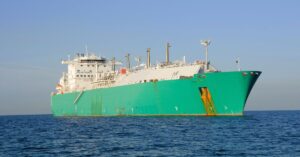
Panama Recovers $8.5 Million In Owed Wages For Seafarers In 2024
May 23, 2025
Panama Maritime Authority Brings New Rule For STS Transfers To Deal With Russian Shadow Fleet
May 24, 2025

LNG Tanker Iberica Knutsen grounded outside Mukran Port, Germany, on May 22, 2025, and though it was quickly set free, environmentalists and activists are criticising Germany’s LNG terminals.
Critics say that German LNG terminals were rushed as Berlin moved quickly to establish them after Russia attacked Ukraine, so it could begin gas imports from the U.S and other nations.
The Norwegian tanker was constructed in 2006 and operated by Knutsen Group. It was inbound from the Sabine Pass and was carrying natural gas.
The tanker has a capacity of 138,000 m3 and is of a standard size, with a length of 277 m and an operating draft of 11.4 m.
A resident reported seeing the tanker from his window while making his morning coffee after 6:00 a.m. and immediately thought that it should not be where it was, and was moving strangely. He thought it had become stuck.
He watched over the next three hours when tugs worked to free it, and German water police also arrived at the scene, after which the LNG Tanker was escorted to a nearby anchorage.
The vessel was ordered to remain at the anchorage while the investigation is ongoing and a complete survey of the hull is done.
Though a small incident, it has sparked calls for Germany to end its LNG imports. The Mukran terminal is close to the famous resort area of Rügen Island. It was the only privately developed facility which was established by Deutsche ReGas.
Sascha Müller-Kraenner, Federal Managing Director of DUH, said that this incident was a reminder of the safety risks associated with LNG delivery and the operation of the terminal in Germany, and demanded an immediate halt to further deliveries.
Critics also say that the terminal is underutilised, with data pointing to the fact that it was functioning at just 5% of its capacity. Deutsche ReGas said that a part of the problem is the unfair competition from terminals sponsored by the state.
Germany requires import capabilities for replacing gas imports from Moscow, which earlier came in through pipelines.
The nation stockpiled gas imported from the U.S to meet demands during winter; however, it has vowed to end Russian imports, which makes the operations of the FSRU terminals vital.
References: LNG Prime, Energate Messenger
Source: Maritime Shipping News


